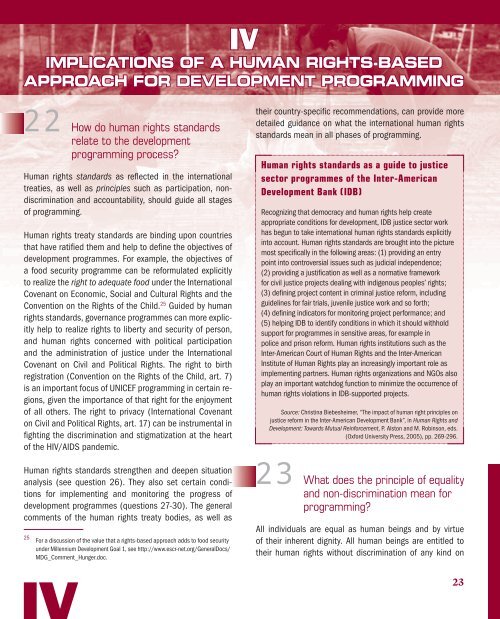Frequently Asked Questions on Human Rights-Based Approach
Frequently Asked Questions on Human Rights-Based Approach
Frequently Asked Questions on Human Rights-Based Approach
- No tags were found...
You also want an ePaper? Increase the reach of your titles
YUMPU automatically turns print PDFs into web optimized ePapers that Google loves.
IVIMPLICATIONS OF A HUMAN RIGHTS-BASEDAPPROACH FOR DEVELOPMENT PROGRAMMING22 How do human rights standardsrelate to the developmentprogramming process?<strong>Human</strong> rights standards as refl ected in the internati<strong>on</strong>altreaties, as well as principles such as participati<strong>on</strong>, n<strong>on</strong>discriminati<strong>on</strong>and accountability, should guide all stagesof programming.<strong>Human</strong> rights treaty standards are binding up<strong>on</strong> countriesthat have ratifi ed them and help to defi ne the objectives ofdevelopment programmes. For example, the objectives ofa food security programme can be reformulated explicitlyto realize the right to adequate food under the Internati<strong>on</strong>alCovenant <strong>on</strong> Ec<strong>on</strong>omic, Social and Cultural <strong>Rights</strong> and theC<strong>on</strong>venti<strong>on</strong> <strong>on</strong> the <strong>Rights</strong> of the Child. 25 Guided by humanrights standards, governance programmes can more explicitlyhelp to realize rights to liberty and security of pers<strong>on</strong>,and human rights c<strong>on</strong>cerned with political participati<strong>on</strong>and the administrati<strong>on</strong> of justice under the Internati<strong>on</strong>alCovenant <strong>on</strong> Civil and Political <strong>Rights</strong>. The right to birthregistrati<strong>on</strong> (C<strong>on</strong>venti<strong>on</strong> <strong>on</strong> the <strong>Rights</strong> of the Child, art. 7)is an important focus of UNICEF programming in certain regi<strong>on</strong>s,given the importance of that right for the enjoymentof all others. The right to privacy (Internati<strong>on</strong>al Covenant<strong>on</strong> Civil and Political <strong>Rights</strong>, art. 17) can be instrumental infi ghting the discriminati<strong>on</strong> and stigmatizati<strong>on</strong> at the heartof the HIV/AIDS pandemic.<strong>Human</strong> rights standards strengthen and deepen situati<strong>on</strong>analysis (see questi<strong>on</strong> 26). They also set certain c<strong>on</strong>diti<strong>on</strong>sfor implementing and m<strong>on</strong>itoring the progress ofdevelopment programmes (questi<strong>on</strong>s 27-30). The generalcomments of the human rights treaty bodies, as well as25For a discussi<strong>on</strong> of the value that a rights-based approach adds to food securityunder Millennium Development Goal 1, see http://www.escr-net.org/GeneralDocs/MDG_Comment_Hunger.doc.their country-specifi c recommendati<strong>on</strong>s, can provide moredetailed guidance <strong>on</strong> what the internati<strong>on</strong>al human rightsstandards mean in all phases of programming.<strong>Human</strong> rights standards as a guide to justicesector programmes of the Inter-AmericanDevelopment Bank (IDB)Recognizing that democracy and human rights help createappropriate c<strong>on</strong>diti<strong>on</strong>s for development, IDB justice sector workhas begun to take internati<strong>on</strong>al human rights standards explicitlyinto account. <strong>Human</strong> rights standards are brought into the picturemost specifi cally in the following areas: (1) providing an entrypoint into c<strong>on</strong>troversial issues such as judicial independence;(2) providing a justifi cati<strong>on</strong> as well as a normative frameworkfor civil justice projects dealing with indigenous peoples’ rights;(3) defi ning project c<strong>on</strong>tent in criminal justice reform, includingguidelines for fair trials, juvenile justice work and so forth;(4) defi ning indicators for m<strong>on</strong>itoring project performance; and(5) helping IDB to identify c<strong>on</strong>diti<strong>on</strong>s in which it should withholdsupport for programmes in sensitive areas, for example inpolice and pris<strong>on</strong> reform. <strong>Human</strong> rights instituti<strong>on</strong>s such as theInter-American Court of <strong>Human</strong> <strong>Rights</strong> and the Inter-AmericanInstitute of <strong>Human</strong> <strong>Rights</strong> play an increasingly important role asimplementing partners. <strong>Human</strong> rights organizati<strong>on</strong>s and NGOs alsoplay an important watchdog functi<strong>on</strong> to minimize the occurrence ofhuman rights violati<strong>on</strong>s in IDB-supported projects.Source: Christina Biebesheimer, “The impact of human right principles <strong>on</strong>justice reform in the Inter-American Development Bank”, in <strong>Human</strong> <strong>Rights</strong> andDevelopment: Towards Mutual Reinforcement, P. Alst<strong>on</strong> and M. Robins<strong>on</strong>, eds.(Oxford University Press, 2005), pp. 269-296.23 What does the principle of equalityand n<strong>on</strong>-discriminati<strong>on</strong> mean forprogramming?All individuals are equal as human beings and by virtueof their inherent dignity. All human beings are entitled totheir human rights without discriminati<strong>on</strong> of any kind <strong>on</strong>23
















